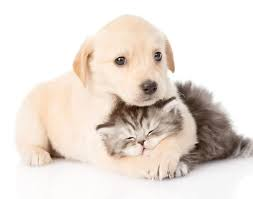Are You Poisoning Your Cat?
Animal Doc AM Multi-Media 19June2012
with Dr. Don DeForge
Are You Poisoning Your Cat?
There are three common poisoning areas in and around your home that can lead to serious toxicity in your cat:
- Over the counter and prescription medicines
- Plants
- Rodenticides, Pesticides, Herbicides, and Chemicals stored in your home
Category #1 Medicines
Be very careful with medicines. Pills can be dropped on the floor that cats can lick up.
Cats can also break open foil wraps and ingest medicines. Knocked over pill bottles with lids non-secured are also attractive to cats. Keep all of your medicines in locked medicine cabinets.
Poisoning can occur with many medicines including: heart medicines, blood pressure medicines, anti-coagulant medicines, anti-depressants, and pain killers. Never give your cat Acetominophen or Ibuprofen for pain. Aspirin should only be used under the direction of a veterinarian in the new low dosage formulation.
Category #2 Poisonous Plants
There are many plants toxic to cats. Below is only a partial listing. Refer to the ASPCA Poison Control Website for a complete listing. All members of the lily family can cause irreversible kidney failure in the cat. Do not bring any variety of the lily into your home as growing plants or arrangements. Even a tiny amount can cause death from kidney disease.
Partial Listing of Poisonous Plants to Cats to Read About and Avoid!
- All varieties of the Lily Plant
- Castor Bean
- Oleander
- Azalea and Rhododendron
- Cyclamen
- Yew
- Sago Palm
- Kalanchoe
- Marijuana
- Confusion
- Tremors
- Muscle twitching
- Disorientation
- Difficult Breathing
- Diarrhea
- Vomiting
- Weakness
- Inability to walk
- Pupil Dilation
- Not able to eat or drink
- Excessive Urination and excessive thirst
- Pawing at the mouth
- Pale gums or lavender gums
- Panting
- Hyper-agitation or Hyper-excitement
Also keep the number of an Animal Poison Control Center by the Phone.
ASPCA Poison Control: 1-888-426-4435
There is a fee for any Poison Control Center. Have a credit card available as you prepare to speak to the toxicologist to avoid loss of precious time.
Category #3-Dangerous Chemicals Outside and Inside of Your Home
As we enter summer, we have a plethora of rodenticides, pesticides, and herbicides in our yards. Be sure you read the instructions carefully on the packaging. Lock and secure these products when not in use. When spraying, dusting, or applying make sure that your cat is not in direct contact with the product. Follow the packaging insert instructions exactly as stated. Read on the insert, also, when it is safe to allow the pet back into a treated site.
GO GREEN! Find products that are environmentally safe and non-toxic for pets and children. These products are readily available at most large garden centers.
Finally, household products should be kept in locked cabinets away from your pets and your special investigative feline friends. Do not leave caustic agents in unattended buckets when cleaning. Do not add products to the toilet bowl that are not listed as safe for pets if ingested. Lock your garbage containers to stop your cat from getting into materials that have been discarded.
Practice C&C Safety
C&C stands for Cats and Children. Use the same precautions for your cat as you would for a two year old child in that very investigative stage. Remember prevention is the key to stopping 99% of poisonings. Some risk factors will always be present but most can be eliminated by re-reading today's BLOG on Poisoning Risk Factors in Cats. Enjoy your cat and always be alert.
Keep the Poison Control Center Phone number and your local ER Center's Phone number by your phone. You are your PET'S ADVOCATE. Show your love with attention to prevention!
Dr. Don DeForge
Animal Doc AM
Please post questions on this Blog or write
DonDeForge@aol.com
Silver Sands Veterinary Center-www.SilverSandsVeterinary.com
17 Seemans Lane Milford, CT. 06460
1-800-838-3368
Visit us on Facebook at Silver Sands Veterinary and Animal Doc AM-[Become a friend]
Visit us on Twitter at Time to Talk Fact with Don DeForge


Comments
Post a Comment